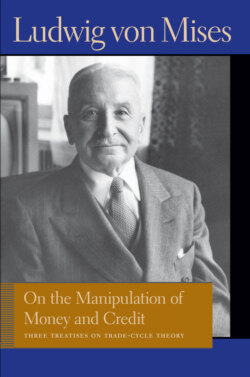Читать книгу On the Manipulation of Money and Credit - Людвиг фон Мизес - Страница 15
На сайте Литреса книга снята с продажи.
6. Final Phases
ОглавлениеThe process of driving notes out of service as money can take place either relatively slowly or abruptly in a panic, perhaps in days or even hours. If the change takes place slowly that means trade is shifting, step by step, to the general use of another medium of exchange in place of the notes. This practice of making and settling domestic transactions in foreign money or in gold, which has already reached substantial proportions in many branches of business, is being increasingly adopted. As a result, to the extent that individuals shift more and more of their cash holdings from German marks to foreign money, still more foreign exchange enters the country. As a result of the growing demand for foreign money, various kinds of foreign exchange, equivalent to a part of the value of the goods shipped abroad, are imported instead of commodities. Gradually, there is accumulated within the country a supply of foreign moneys. This substantially softens the effects of the final breakdown of the domestic paper standard. Then, if foreign exchange is demanded even in small transactions, if, as a result, even wages must be paid in foreign exchange, at first in part and then in full, if finally even the government recognizes that it must do the same when levying taxes and paying its officials, then the sums of foreign money needed for these purposes are, for the most part, already available within the country. The situation, which emerges then from the collapse of the government’s currency, does not necessitate barter, the cumbersome direct exchange of commodities against commodities. Foreign money from various sources then performs the service of money, even if somewhat unsatisfactorily.
Not only do incontrovertible theoretical considerations lead to this hypothesis. So does the experience of history with currency breakdowns. With reference to the collapse of the “Continental Currency” in the rebellious American colonies (1781), Horace White says: “As soon as paper was dead, hard money sprang to life, and was abundant for all purposes. Much had been hoarded and much more had been brought in by the French and English armies and navies. It was so plentiful that foreign exchange fell to a discount.”5
In 1796, the value of French territorial mandats fell to zero. Louis Adolphe Thiers commented on the situation as follows:
Nobody traded except for metallic money. The specie, which people had believed hoarded or exported abroad, found its way back into circulation. That which had been hidden appeared. That which had left France returned. The southern provinces were full of piasters, which came from Spain, drawn across the border by the need for them. Gold and silver, like all commodities, go wherever demand calls them. An increased demand raises what is offered for them to the point that attracts a sufficient quantity to satisfy the need. People were still being swindled by being paid in mandats, because the laws, giving legal tender value to paper money, permitted people to use it for the satisfaction of written obligations. But few dared to do this and all new agreements were made in metallic money. In all markets, one saw only gold or silver. The workers were also paid in this manner. One would have said there was no longer any paper in France. The mandats were then found only in the hands of speculators, who received them from the government and resold them to the buyers of national lands. In this way, the financial crisis, although still existing for the state, had almost ended for private persons.6
